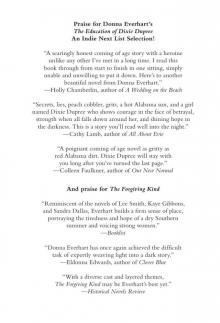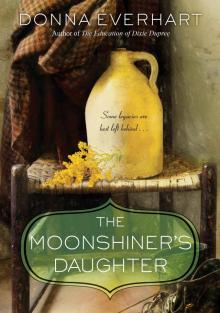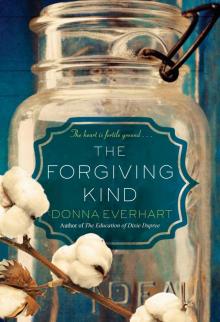- Home
- Donna Everhart
The Moonshiner's Daughter (ARC)
The Moonshiner's Daughter (ARC) Read online
Praise for Donna Everhart’s
The Education of Dixie Dupree
An Indie Next List Selection!
“A searingly honest coming of age story with a heroine
unlike any other I’ve met in a long time. I read this
book through from start to finish in one sitting, simply
unable and unwilling to put it down. Here’s to another
beautiful novel from Donna Everhart.”
—Holly Chamberlin, author of A Wedding on the Beach
“Secrets, lies, peach cobbler, grits, a hot Alabama sun, and a girl named Dixie Dupree who shows courage in the face of betrayal, strength when all falls down around her, and shining hope in the darkness. This is a story you’ll read well into the night.”
—Cathy Lamb, author of All About Evie
“A poignant coming of age novel as gritty as
red Alabama dirt. Dixie Dupree will stay with
you long after you’ve turned the last page.”
—Colleen Faulkner, author of Our New Normal
And praise for The Forgiving Kind
“Reminiscent of the novels of Lee Smith, Kaye Gibbons,
and Sandra Dallas, Everhart builds a firm sense of place,
portraying the tiredness and hope of a dry Southern
summer and voicing strong women.”
— Booklist
“Donna Everhart has once again achieved the difficult
task of expertly weaving light into a dark story.”
—Eldonna Edwards, author of Clover Blue
“With a diverse cast and layered themes,
The Forgiving Kind may be Everhart’s best yet.”
— Historical Novels Review
Ever_9781496717023_2p_all_r1.indd 1
8/2/19 3:30 PM
Books by Donna Everhart
THE EDUCATION OF DIXIE DUPREE
THE ROAD TO BITTERSWEET
THE FORGIVING KIND
THE MOONSHINER’S DAUGHTER
Published by Kensington Publishing Corporation
Ever_9781496717023_2p_all_r1.indd 2
8/2/19 3:30 PM
THE
MOONSHINER’S
DAUGHTER
DONNA EVERHART
KENSINGTON BOOKS
www.kensingtonbooks.com
Ever_9781496717023_2p_all_r1.indd 3
8/2/19 3:30 PM
This book is a work of fiction. Names, characters, places, and incidents either are products of the author’s imagination or are used fictitiously. Any resemblance to actual persons, living or dead, events, or locales is entirely coincidental.
KENSINGTON BOOKS are published by
Kensington Publishing Corp.
119 West 40th Street
New York, NY 10018
Copyright © 2020 by Donna Everhart
All rights reserved. No part of this book may be reproduced in any form or by any means without the prior written consent of the Publisher, excepting brief quotes used in reviews.
All Kensington titles, imprints, and distributed lines are available at special quantity discounts for bulk purchases for sales promotion, premiums, fund-raising, educational, or institutional use.
Special book excerpts or customized printings can also be created to fit specific needs. For details, write or phone the office of the Kensington Sales Manager: Kensington Publishing Corp., 119 West 40th Street, New York, NY 10018. Attn. Sales Department. Phone: 1-800-221-2647.
Kensington and the K logo Reg. U.S. Pat. & TM Off.
ISBN-13: 978-1-4967-1703-0 (ebook)
ISBN-10: 1-4967-1703-1 (ebook)
Kensington Electronic Edition: January 2020
ISBN-13: 978-1-4967-1702-3
ISBN-10: 1-4967-1702-3
First Kensington Trade Paperback Printing: January 2020
10 9 8 7 6 5 4 3 2 1
Printed in the United States of America
Ever_9781496717023_2p_all_r1.indd 4
8/2/19 3:30 PM
For Mom, a warrior—battle on
Ever_9781496717023_2p_all_r1.indd 5
8/2/19 3:30 PM
Ever_9781496717023_2p_all_r1.indd 6
8/2/19 3:30 PM
Acknowledgments
An author’s success is built on the backs of many. Without
the help, encouragement, and hard work from the following
people, I would most likely still be an IT cubicle rat working somewhere in corporate America. To that end, I would like to extend my sincere appreciation to the following individuals: To John Scognamiglio, I am truly indebted to you for your
inspiring words and the enthusiasm you express for my sto-
ries. Those moments are the fuel to the furnace of my imagi-
nation.
To John Talbot, my talented agent, you’ve shown nothing
but rock-solid support over the years and it is so appreciated.
Your dedication to me, and my writing, have enabled me to
keep moving forward with my career.
Vida and Lulu, you make the magic happen behind the
scenes. I am deeply grateful for your efforts, and tireless promotion on my behalf.
Kris, I am in awe of your talent. Your cover designs steal
my breath away.
To Lauren, Paula, and the rest of the Kensington team, I
am indebted to all of you for what you do, each and every day.
My fellow Kensington authors, Mandy, Eldonna, and
Lynne, there is no doubt having you as part of my life enriches me beyond measure.
To all the independent bookstores and booksellers who
strive to help authors connect to readers, you provide an important service to our communities; my profound thanks to
you.
To the libraries that nurture and encourage a reading life
Ever_9781496717023_2p_all_r1.indd 7
8/2/19 3:30 PM
viii ACK NOW LEDGM EN TS
that often begins for many in schools, and beyond, I owe you a lifetime of gratitude. Visiting the library as a child was the highlight of my week while growing up.
To all the book clubs, I am truly appreciative of your sup-
port for my work.
Jamie Adkins, of The Broad Street Deli and Market, you
have created such a special place in our small town, and in my heart.
To the book cheerleaders who work so hard to diligently
promote my work online through social media, I am grateful.
It’s because of individuals like you that word of mouth about good books has taken on new meaning. From Kristy Bar-rett, to Susan Peterson, Linda Zagon, Susan Roberts, Leslie
Hamod, Dawnny and Denise (the dynamic duo!). and too
many more to name, thank you again and again!
A very special thank-you to a fierce writer, J. C. Sasser,
not only for the use of your last name, but for all those phone calls, the friendship, and so much more.
I am forever grateful to my family for always being there
and supporting me. I love you all very much.
To Blaine, my devoted husband, I know no words are nec-
essary, but sometimes they are, and this is one of those times.
You always tell me “don’t worry,” and I do anyway, but I still need to hear that because it means you have faith in what I do.
All my love, always.
Ever_9781496717023_2p_all_r1.indd 8
8/2/19 3:30 PM
We wander, question. But the answer waits in each separate heart—the answer of our own identity and the way by which
we can master loneliness and feel that at last we belong.
�
��Carson McCullers,
The Mortgaged Heart: Selected Writings, 1971
Ever_9781496717023_2p_all_r1.indd 9
8/2/19 3:30 PM
Ever_9781496717023_2p_all_r1.indd 10
8/2/19 3:30 PM
Chapter 1
The only memory I have of Mama, she was on fire.
I’d been watching my baby brother, Merritt, digging in the
dirt, when I heard a subtle pop, then a loud explosion, and the big pot Daddy and Mama were always tending suddenly burst
into flames, and so did Mama. The sight made me grip hold
of Merritt’s hand hard enough to make him squeal.
Daddy would sometimes have to burn tent caterpillars.
He’d hold a flaming end to the white cottony fuzz woven
around the branches of the apple trees, and as the nests blazed, the black wormy bodies fell and hit the ground like the soft patter of raindrops. Fire always saved the fruit, but it’s what took Mama from us.
Mama took off running, going this way and that.
Daddy yelled, “Lydia!” and then, “Stay there, Jessie!” to me.
Merritt had already gone back to stabbing a stick in the
mud over and over, making baby noises, completely unaware.
Mama beat her hands against her head; then they caught fire
too. She ran in a zigzag pattern, as if performing a strange and chaotic dance.
Ever_9781496717023_2p_all_r1.indd 1
8/2/19 3:30 PM
2
D ON N A E V E R H A RT
Daddy tried to catch her, yelling over and over, “Stop run-
ning!”
Somehow she evaded him, his efforts to help. He stumbled,
twisted his ankle, and then he couldn’t run near as fast, staggering after her, limping badly.
She didn’t make any noise until the last seconds before she
fell, when she shrieked his name, “Easton!”
The cry came long, and high-pitched, like a siren. She
faltered, collapsed, everything from her head down to the
tops of her legs consumed. Daddy threw himself over her,
smacking his hands along her body. His movements frantic,
he jerked his T-shirt over her head and pulled it down as far as it would go. If the flames singed him while he held her, he didn’t act like he noticed. Puffs of smoke curled and drifted around them like tiny gray clouds while an odd stench penetrated my nose, a distinct smell that held me rooted in place.
The imprint of her face came through his shirt.
I quit crying and waited for them to get up, for her to start laughing and say, Did I scare you?
The fabric over her face where her mouth pushed against
the cloth was a perfect oval. The only movement a slow suck-
ing in and out of the now smutty material. That spot mes-
merized me. In. out. After a few seconds, the area no longer moved. Daddy struggled to sit upright, still cradling her upper half. Her arms lay limp at her sides, hands blackened. He tilted his head like he didn’t understand what happened any
more than I did.
He bent close, whispered in the area of her ear, “Lydia?”
Mama didn’t answer, didn’t move. I remained fixated,
waiting. He pulled his shirt up and away. Where she’d been
creamy-skinned, she was raw, charred, peeling. Her hair
was mostly gone, and only a few wispy clumps still clung to
her skull, while her blouse was near about scorched off. It
didn’t matter though, because everything, her face, the lack Ever_9781496717023_2p_all_r1.indd 2
8/2/19 3:30 PM
THE MOONSHINER’S DAUGHTER
3
of movement, was wrong, all wrong. It was as if she’d melted away, and my world turned as lopsided as the crooked bend of her torso in his arms.
Merritt had lost interest in his dirt digging and started
toward them, steps unsteady as he made his way over the roots and leaves, dragging the stick along the ground.
He whispered, “Mama-mama-mama,” but this was over-
taken by Daddy’s gasping.
He appeared to be trying to breathe for the both of them.
He made noises such as I’d never heard before.
I mimicked Merritt, whispering, “Mama?”
This is what I remember. The three of us making our dis-
tress known while Mama lay forever silent.
I was four years old when she died, according to the date
on her gravestone, July 10, 1948. It was twelve years ago, and although I’ve tried to remember her before that terrible day, I can’t. Her features before the accident are blurry, like a picture that’s had water dropped on it, smearing everything so
it’s like looking through a frosty window. I also can’t say what happened right after, what we did, where we went, who came
to help us. I can’t call to mind no service, or the burial. Obviously there was one because of that gravestone, which holds
all I know, her name, Lydia Marsh Sasser, and the date of her death, both engraved within a heart.
New routines filled the empty gaps her passing left in our
small world. Somehow, we made do. There’d be times when
I’d purposefully recall what little I knew, and each image
would flip by in my head, like the slide projectors teachers use in school. Sometimes there’d be moments when something
from deep within would break through all on its own. Once
was when I was around eleven, and Merritt and I’d gone to
one of the stills tucked back in the woods where we were
making sour mash. There’s an odor to it, and I came to realize Ever_9781496717023_2p_all_r1.indd 3
8/2/19 3:30 PM
4
D ON N A E V E R H A RT
I’d smelled that very same thing just before Mama caught fire.
A puzzle piece fell into place. Merritt, who was nine, hap-
pened to bring her up as I was having this moment of clarity.
He said, “Jessie, you reckon our mama ever did this?”
My hands had gone sweaty as that one single thought dared
to peek through a thick veil, surfacing through foamy mem-
ory, boldly rising up and out of my head, like the bubbles in the sour mash I stirred.
I mumbled, “I don’t know, but I think it’s what killed her.”
Merritt stopped poking at the wood he was stacking under
the boiler, my comment so out of the blue neither of us moved for several seconds. I quit stirring, and kicked at the collected logs nearby.
I pointed at the boiler, “The day she died, it smelled like
that, but there was another odor too.”
Merritt grew wide-eyed. “What was it?”
I shook my head, wouldn’t allow that uglier fragment to
emerge.
“I don’t want to remember that part.”
“Was I there?”
“Yes.”
“What was I doing?”
“Playing in the dirt.”
“And then what?”
“I don’t know.”
The tops of the trees overhead created lacy, waving pat-
terns of green against a blanket of solid gray, thick, and heavy.
Above the clouds existed a deep blue heaven, and a sun that
shone hot and brilliant, but it was as if that world didn’t exist at this moment. Trying to remember her as she’d been was
like that. If I could wipe away the clouds in my head, I was sure I’d be able to bring her to mind. He’d gone back to stacking wood, and I’d gone back to stirring the mash.
Daddy refusing to talk about Mama was like trying to solve
Ever_9781496717023_2p_all_r1.indd 4
8/2/19 3:30 PM
THE MOONSHINER’S DAUGHTER
5
a math problem with only part of the equation. This is impossible because you’ve got to have all the necessary steps, and without his help I was stuck. Back then, I’d ask him about it every now and then.
“When Mama died, there was a popping sound, and then a
bigger noise; what happened?”
He’d say, “Jessie, it was so long ago.”
“But Daddy, she was burning, I remember it. How did it
happen?”
“I wished you’d not ask them questions. Think about some-
thing else.”
“Well. Why ain’t we got no pictures of her?”
“I got to get to work. Don’t forget to lock up when y’all
leave for the bus.”
There came the time when he started to get mad about it
and he’d yell at me, “Jessie! I mean it! One more word about that, and you’ll regret it!”
I crept away and the pan of peach cobbler I’d made the
night before became my temporary solace. I pulled it from the oven, grabbed a spoon, and stuck one in Merritt’s hand too.
He quit after a few bites. “I can’t eat no more.”
I stopped but only for a second. I could eat more, and I
did. I ate and ate, miserably spooning in sweet, slick peaches, soft buttery cake, while scraping the sugary golden syrup off the bottom of the pan. It was half-gone before I realized it, and then I was so sick I wanted to throw up. Had to. I went
down the hall and into the bathroom holding my tight stom-
ach. I stared at the toilet and thought how it felt when I had a stomach bug, the misery of getting sick, and the relief that followed. I got on my knees. I tried gagging. It didn’t work.
I remembered how when I brushed my teeth, I’d sometimes
get the toothbrush too far back and it would almost make me
throw up, so I tried sticking my finger down my throat. I did it again, a little farther, and retched. Again, again. Finally, Ever_9781496717023_2p_all_r1.indd 5
8/2/19 3:30 PM
6
D ON N A E V E R H A RT
the cobbler came up and a good, clean feeling followed. I felt better.
Relieved, I sat on the floor. It made no sense how Daddy
acted. I was simply asking about Mama, how she died. His
aggravation and refusal to talk about her fueled my strange
hunger, and after I would always feel the need to rid myself of all I could, as if by doing so I could expel my own anger.
It worked for a while.
Time came and went with little change. When I was thir-
teen, I asked Uncle Virgil about her. He rubbed at his neck

 The Moonshiner's Daughter (ARC)
The Moonshiner's Daughter (ARC) The Moonshiner's Daughter
The Moonshiner's Daughter The Forgiving Kind
The Forgiving Kind The Road to Bittersweet
The Road to Bittersweet